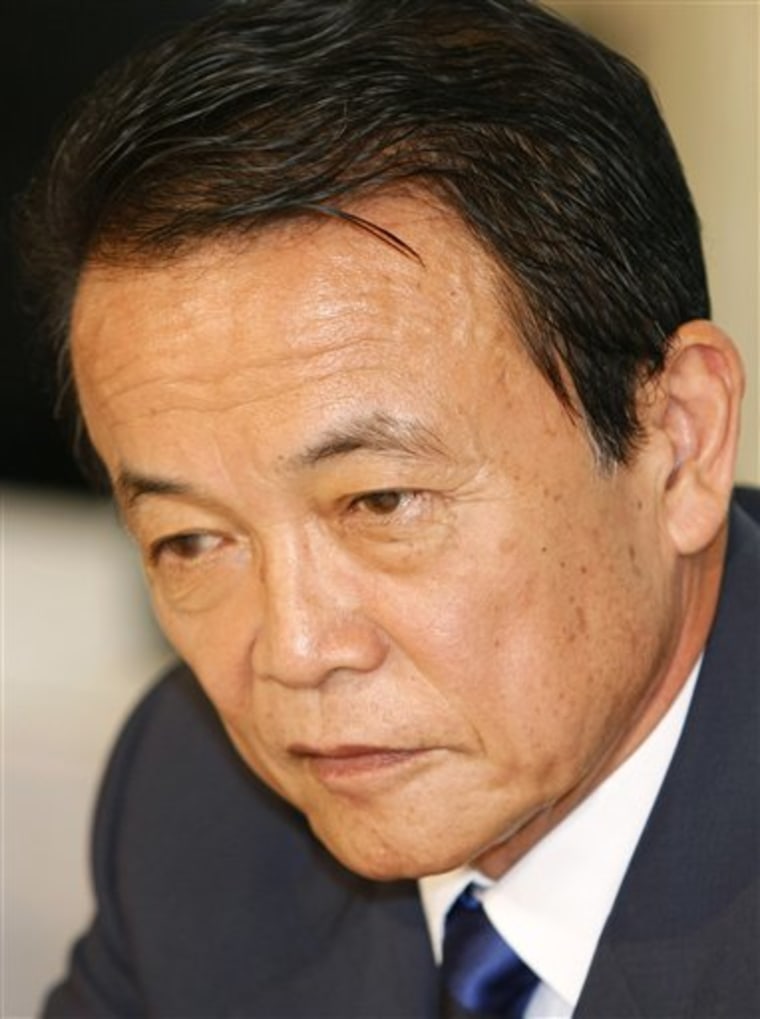The political party that has governed Japan for the last 50 years could be ousted from power in national elections next month — with the opposition boosted by worries over the economy and gaffes by the ruling party.
Prime Minister Taro Aso's Liberal Democratic Party was dealt a crushing defeat over the weekend, losing its majority in a Tokyo municipal election while the opposition made substantive gains.
His announcement Monday that he was dissolving parliament and scheduling elections for Aug. 30 increased the likelihood that the main opposition could take over the powerful lower house of Parliament. The upper house is already controlled by the opposition bloc.
The Liberal Democrats, which have governed Japan for the past 50 years, except a brief period in 1993, have been struggling to maintain their grip on power.
Over the past few years, the party has seen a revolving door of prime ministers, with Aso's two predecessors lasting less than a year. Aso, too, has failed to revitalize the party, which many say has been in power too long to effectively energize voters seeking change in the face of the financial downturn.
"It's time to seek the public's mandate. The issue here is which party can really protect the people's lives and the country," Aso said. "I'm not going to run away."
He said he would dissolve parliament's lower house next week.
Parties sign no-confidence motion
In a move that could further malign Aso's battered party, the Democratic Party and three other opposition parties jointly submitted a no-confidence motion to parliament on Monday. The motion, to be voted on Tuesday, was to have little real effect other than to embarrass the party and delay discussions on pending bills.
Many policies of the Democratic Party of Japan are quite similar to Aso's and a leadership change is unlikely to create a drastic change in the country's economic and diplomatic policies. But a win by the main opposition — which has been steadily gaining support from voters who want to see a change — could also trigger regrouping within and between political parties.
The Liberal Democrats and their coalition partner lost their majority in Sunday's ballots for the Tokyo Metropolitan Assembly, the local parliament for Japan's capital and most populated prefecture. While the results do not directly affect the central government, it was closely watched as a bellwether for the national elections. It was also the fifth straight regional election loss for Aso's party since April.
"We will keep our momentum going," said Democratic Party executive Seiji Maehara, vowing to score another major win in the key national elections.
Tokyo Gov. Shintaro Ishihara, a ruling party member, blamed Aso for the loss, and predicted similar results in national elections.
Public unhappy with prime minister
Aso's popularity, which has remained low at 20 percent for the past several months, has been hurt by a series of scandals, including accusations that one of his ministers turned up drunk to a news conference. Aso has also embarrassed himself, repeatedly making reading mistakes and remarks that angered the public — he criticized the elderly for racking up medical expenses and being a tax burden.
Members of the ruling party have called for fresh leadership ahead of national elections, while others are already jumping ship — lawmaker Kotaro Nagasaki submitted his withdrawal from the party on Monday.
As prime minister, Aso can call for general parliamentary elections at any time, but they must take place by October. He had apparently been waiting, gambling that his political situation could improve, but the dire results of the Tokyo election seemed to have forced his hand.
"The results of the Tokyo Metropolitan Assembly election were very bad," said Tsuneo Watanabe, a senior fellow at the Tokyo Foundation think tank. "We will have a new prime minister in the next month."
Recent newspaper opinion polls have suggested the opposition party is well-placed to make considerable gains or even rise to power in the national election, with its leader Yukio Hatoyama likely to replace Aso.
'Time for a new era'
Hatoyama says it's time for a new era in Japanese politics and that the country should be inspired by President Barack Obama's win in last year's elections in the United States, Japan's top ally. His Democratic Party of Japan has promised to improve welfare measures, lower the cost of education, reduce bureaucracy and strengthen the agricultural sector.
Still, there would need to be a sea change in voter support for the opposition to take power. The Liberal Democrats currently have 303 seats in the 480-seat lower house, and its partner Komeito has 31. The Democratic Party has just 112.
Some Japanese voters said Monday that Aso should have waited before calling for general elections.
"I wish he had fought a bit longer," said Mineaki Kamada, 26, a worker in Tokyo.
Others, like Takuya Hayashida, 28, are ready for a change: "I'd like to see a different Japan."
